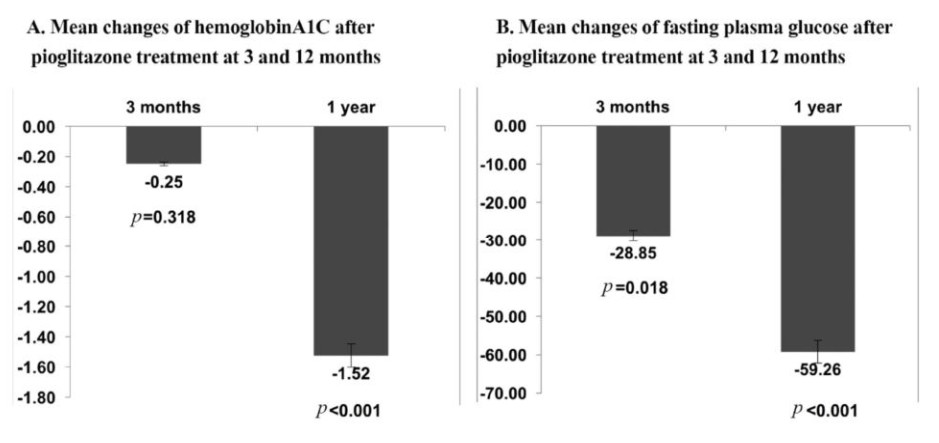SAFETY AND EFFICACY OF PIOGLITAZONE AMONG TYPE 2 DIABETES MELLITUS PATIENTS RECEIVING LONG TERM HEMODIALYSIS
DOI:
https://doi.org/10.55374/jseamed.v2i1.19Keywords:
End stage renal disease, Hemodialysis, Diabetes Mellitus, Thiazolidinedione, PioglitazoneAbstract
Background: Type 2 diabetes mellitus (T2DM) frequently causes end stage renal disease (ESRD). Glucose-lowering treatment options for patients with T2DM with ESRD are limited. Thiazolidinedione is an oral glucose lowering agent used to treat patients with ESRD. We evaluated the potential for pioglitazone in combination with other hypoglycemic medications among patients with T2DM receiving long term hemodialysis Objectives: To evaluate the safety and efficiency of pioglitazone among patients with ESRD receiving hemodialysis. Methods: The retrospective study was conducted in the outpatient clinic of Phramongkutklao Hospital during 2006 and 2015. HemoglobinA1C (HbA1c), fasting plasma glucose (FPG), body weight, hematocrit and history of diagnosed chronic heart failure were evaluated after starting medication and 1 year of follow-up Results: Data for hemodialysis patients on pioglitazone were analyzed (n=50). Mean FPG changes from baseline were -28.8+-80.0 mg/dL after 12 weeks (p=0.018) and -59.2+-80.0 mg/dL after 12 months of treatment (p < 0.001). Mean HbA1c changes from baseline were also-0.25+-1.62% after 12 weeks (p=0.318) and -1.52+-1.77% after 12 months of treatment (p < 0.001). The differences in mean body weight (63.2+-13.0 kg; p= 0.139) and hematocrit (33.4+-5.5 vs. 33.6+-5.3; p= 0.929) at baseline and 12 months were not significant, while episodes of congestive heart failure were low (4%). No serious adverse effects such as hypoglycemia with hospitalization or liver failure were observed in any of the patients Conclusion: These data suggest that adding pioglitazone to standard hypoglycemic agents patients with T2DM undergoing hemodialysis glucose control and was well tolerated
Downloads
Metrics
References
Satirapoj B, Adler SG. Comprehensive approach to diabetic nephropathy. Kidney Res Clin Pract 2014;33:121-31. DOI: https://doi.org/10.1016/j.krcp.2014.08.001
Satirapoj B. Nephropathy in diabetes. Adv Exp Med Biol 2012;771:107-22. DOI: https://doi.org/10.1007/978-1-4614-5441-0_11
Adler AI, Stevens RJ, Manley SE, et al. Development and progression of nephropathy in type 2 diabetes: the United Kingdom Prospective Diabetes Study (UKPDS 64). Kidney Int 2003;63:225-32. DOI: https://doi.org/10.1046/j.1523-1755.2003.00712.x
Satirapoj B, Adler SG. Prevalence and Management of Diabetic Nephropathy in Western Countries. Kidney Dis (Basel) 2015;1:61-70. DOI: https://doi.org/10.1159/000382028
Afkarian M, Sachs MC, Kestenbaum B, et al. Kidney disease and increased mortality risk in type 2 diabetes. Journal of the American Society of Nephrology : JASN 2013;24:302-8. DOI: https://doi.org/10.1681/ASN.2012070718
Foley RN, Parfrey PS, Sarnak MJ. Clinical epidemiology of cardiovascular disease in chronic renal disease. Am J Kidney Dis 1998;32:S112-9. DOI: https://doi.org/10.1053/ajkd.1998.v32.pm9820470
Krepinsky J, Ingram AJ, Clase CM. Prolonged sulfonylurea-induced hypoglycemia in diabetic patients with end-stage renal disease. Am J Kidney Dis 2000;35:500-5. DOI: https://doi.org/10.1016/S0272-6386(00)70204-6
Schneider CA, Ferrannini E, Defronzo R, Schernthaner G, Yates J, Erdmann E. Effect of pioglitazone on cardiovascular outcome in diabetes and chronic kidney disease. J Am Soc Nephrol 2008;19:182-7. DOI: https://doi.org/10.1681/ASN.2007060678
Brunelli SM, Thadhani R, Ikizler TA, Feldman HI. Thiazolidinedione use is associated with better survival in hemodialysis patients with non-insulin dependent diabetes. Kidney Int 2009;75:961-8. DOI: https://doi.org/10.1038/ki.2009.4
Lynch KE, Rhee CM, Brunelli SM. Thiazolidinedione use is associated with improved all-cause mortality compared with sulfonylureas among diabetic hemodialysis patients. J Diabetes 2014;6:381-3. DOI: https://doi.org/10.1111/1753-0407.12115
Day C. Thiazolidinediones: a new class of antidiabetic drugs. Diabet Med 1999;16:179-92. DOI: https://doi.org/10.1046/j.1464-5491.1999.00023.x
Schwartz S, Raskin P, Fonseca V, Graveline JF. Effect of troglitazone in insulin-treated patients with type II diabetes mellitus. Troglitazone and Exogenous Insulin Study Group. N Engl J Med 1998;338:861-6. DOI: https://doi.org/10.1056/NEJM199803263381302
Fonseca VA, Valiquett TR, Huang SM, Ghazzi MN, Whitcomb RW. Troglitazone monotherapy improves glycemic control in patients with type 2 diabetes mellitus: a randomized, controlled study. The Troglitazone Study Group. J Clin Endocrinol Metab 1998;83:3169-76. DOI: https://doi.org/10.1210/jc.83.9.3169
Manley HJ, Allcock NM. Thiazolidinedione safety and efficacy in ambulatory patients receiving hemodialysis. Pharmacotherapy 2003;23:861-5. DOI: https://doi.org/10.1592/phco.23.7.861.32727
Abe M, Kikuchi F, Okada K, Kaizu K, Matsumoto K. Efficacy of pioglitazone on type 2 diabetic patients with hemodialysis. Diabetes Res Clin Pract 2008;80:432-8. DOI: https://doi.org/10.1016/j.diabres.2008.01.028
Aronoff S, Rosenblatt S, Braithwaite S, Egan JW, Mathisen AL, Schneider RL. Pioglitazone hydrochloride monotherapy improves glycemic control in the treatment of patients with type 2 diabetes: a 6-month randomized placebo-controlled dose-response study. The Pioglitazone 001 Study Group. Diabetes Care 2000;23:1605-11. DOI: https://doi.org/10.2337/diacare.23.11.1605
Kiryluk K, Isom R. Thiazolidinediones and fluid retention. Kidney Int 2007;72:762-8. DOI: https://doi.org/10.1038/sj.ki.5002442
Lindenfeld J, Masoudi FA. Fluid retention with thiazolidinediones: does the mechanism influence the outcome? J Am Coll Cardiol 2007;49:1705-7. DOI: https://doi.org/10.1016/j.jacc.2007.02.019
Singh S, Loke YK, Furberg CD. Long-term risk of cardiovascular events with rosiglitazone: a meta-analysis. JAMA 2007;298:1189-95. DOI: https://doi.org/10.1001/jama.298.10.1189
Ramirez SP, Albert JM, Blayney MJ, et al. Rosiglitazone is associated with mortality in chronic hemodialysis patients. J Am Soc Nephrol 2009;20:1094-101. DOI: https://doi.org/10.1681/ASN.2008060579
Breunig IM, Shaya FT, McPherson ML, Snitker S. Development of heart failure in Medicaid patients with type 2 diabetes treated with pioglitazone, rosiglitazone, or metformin. J Manag Care Spec Pharm 2014;20:895-903. DOI: https://doi.org/10.18553/jmcp.2014.20.9.895
Ansari A, Thomas S, Goldsmith D. Assessing glycemic control in patients with diabetes and end-stage renal failure. Am J Kidney Dis 2003;41:523-31. DOI: https://doi.org/10.1053/ajkd.2003.50114

Downloads
Published
How to Cite
Issue
Section
License
The Journal of Southeast Asian Medical Research will hold the copyright to all published articles. The publisher's production department handles copyright forms once a manuscript is accepted and scheduled for publication.







